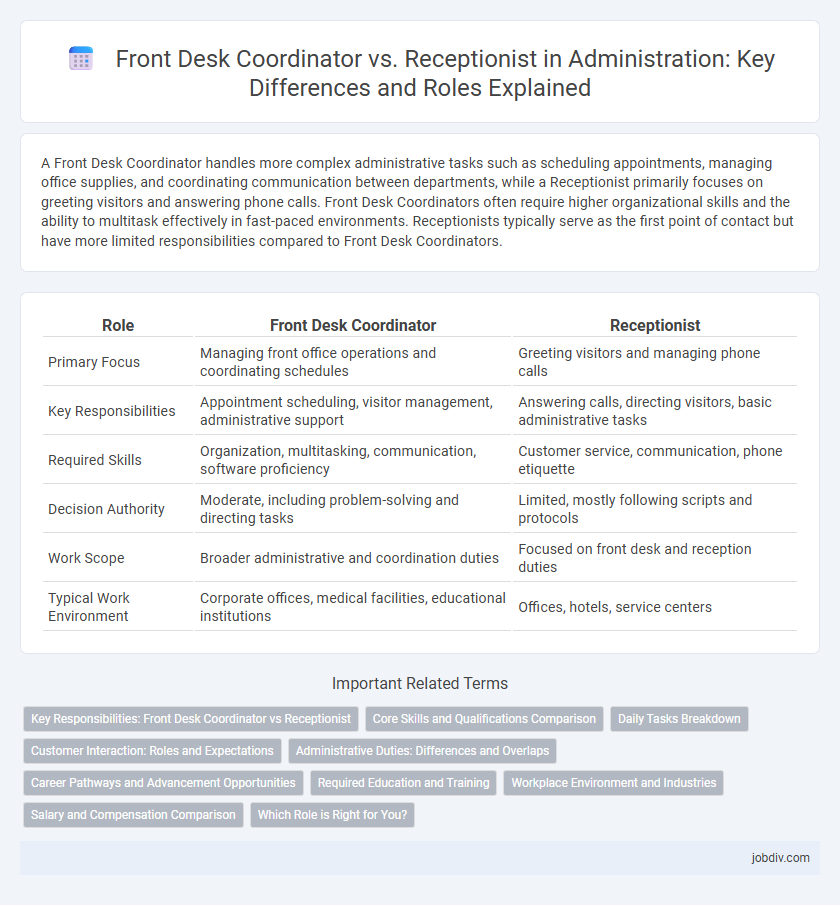A Front Desk Coordinator handles more complex administrative tasks such as scheduling appointments, managing office supplies, and coordinating communication between departments, while a Receptionist primarily focuses on greeting visitors and answering phone calls. Front Desk Coordinators often require higher organizational skills and the ability to multitask effectively in fast-paced environments. Receptionists typically serve as the first point of contact but have more limited responsibilities compared to Front Desk Coordinators.
Table of Comparison
| Role | Front Desk Coordinator | Receptionist |
|---|---|---|
| Primary Focus | Managing front office operations and coordinating schedules | Greeting visitors and managing phone calls |
| Key Responsibilities | Appointment scheduling, visitor management, administrative support | Answering calls, directing visitors, basic administrative tasks |
| Required Skills | Organization, multitasking, communication, software proficiency | Customer service, communication, phone etiquette |
| Decision Authority | Moderate, including problem-solving and directing tasks | Limited, mostly following scripts and protocols |
| Work Scope | Broader administrative and coordination duties | Focused on front desk and reception duties |
| Typical Work Environment | Corporate offices, medical facilities, educational institutions | Offices, hotels, service centers |
Key Responsibilities: Front Desk Coordinator vs Receptionist
Front Desk Coordinators manage appointment scheduling, oversee visitor flow, and coordinate communication between departments to ensure operational efficiency. Receptionists primarily handle greeting visitors, answering phone calls, and managing basic administrative tasks like mail distribution. Both roles require customer service skills, but Front Desk Coordinators typically engage in higher-level organizational duties and multitasking.
Core Skills and Qualifications Comparison
Front Desk Coordinators typically possess advanced organizational skills, proficiency in scheduling software, and strong problem-solving abilities, supporting multiple administrative functions beyond basic greeting duties. Receptionists excel in customer service, communication, and managing incoming calls, serving as the primary point of contact with a focus on visitor management. Both roles require professionalism, multitasking, and familiarity with office equipment, but Front Desk Coordinators often demand higher qualifications, including experience in administrative coordination and data management.
Daily Tasks Breakdown
A Front Desk Coordinator manages complex schedules, coordinates communications between departments, and oversees visitor protocols, while a Receptionist primarily handles greeting guests, answering phone calls, and basic clerical duties. Front Desk Coordinators often supervise reception staff and manage administrative workflows, ensuring smooth office operations. Receptionists focus on front-line customer service and routine administrative support.
Customer Interaction: Roles and Expectations
Front Desk Coordinators manage customer interaction by handling appointments, inquiries, and coordination tasks with a focus on enhancing customer experience and operational efficiency. Receptionists primarily greet visitors, answer phones, and provide basic information, ensuring smooth first impressions and effective communication. Both roles require strong interpersonal skills, but Front Desk Coordinators typically assume more responsibility in client relationship management and administrative duties.
Administrative Duties: Differences and Overlaps
Front Desk Coordinators manage broader administrative duties including scheduling, correspondence, and coordinating office operations, while Receptionists primarily handle greeting visitors, answering phone calls, and basic clerical tasks. Both roles involve managing communication channels and maintaining organized workspaces, but Front Desk Coordinators often oversee more complex administrative functions and support multiple departments. The overlap lies in their shared responsibility for frontline office support and ensuring efficient information flow within the organization.
Career Pathways and Advancement Opportunities
Front Desk Coordinators often manage a broader range of administrative tasks and oversee reception duties, positioning them for advancement into office management or executive assistant roles. Receptionists typically start with basic client interaction and appointment scheduling, creating a foundation for growth into administrative support or customer service management. Both roles offer valuable experience, but Front Desk Coordinators usually access more diverse career pathways due to expanded responsibilities.
Required Education and Training
A Front Desk Coordinator typically requires a higher level of education, often a high school diploma or associate degree combined with specialized training in office management or customer service. Receptionists usually need a high school diploma and on-the-job training to handle basic administrative tasks and front desk operations. Both roles benefit from strong communication skills, but Front Desk Coordinators often receive additional training in scheduling, record-keeping, and advanced software systems.
Workplace Environment and Industries
Front Desk Coordinators typically operate in dynamic workplace environments such as corporate offices, healthcare facilities, and educational institutions, where they manage complex scheduling and coordinate multiple departments. Receptionists often work in a variety of industries including hospitality, retail, and small businesses, focusing on greeting visitors and handling basic administrative tasks. The role of a Front Desk Coordinator demands advanced organizational skills and multitasking in high-paced settings, while receptionists prioritize customer service and front-line communication within more routine work environments.
Salary and Compensation Comparison
Front Desk Coordinators typically earn higher salaries than Receptionists due to greater responsibilities, with average annual pay ranging from $35,000 to $50,000 compared to Receptionists' $28,000 to $40,000. Compensation for Front Desk Coordinators often includes performance bonuses and additional benefits like health insurance and paid time off, reflecting their expanded role in administrative support. Salary variations depend on factors such as industry, location, and level of experience, but Coordinators consistently receive better financial packages than Receptionists.
Which Role is Right for You?
A Front Desk Coordinator typically handles more administrative responsibilities such as managing schedules, coordinating office communications, and supporting team workflow, whereas a Receptionist primarily focuses on greeting visitors, answering calls, and basic clerical tasks. If you prefer a role with greater organizational duties and involvement in office operations, the Front Desk Coordinator position is more suitable. Conversely, if you enjoy direct customer interaction and managing front-line communications, the Receptionist role aligns better with your skills.
Front Desk Coordinator vs Receptionist Infographic

 jobdiv.com
jobdiv.com